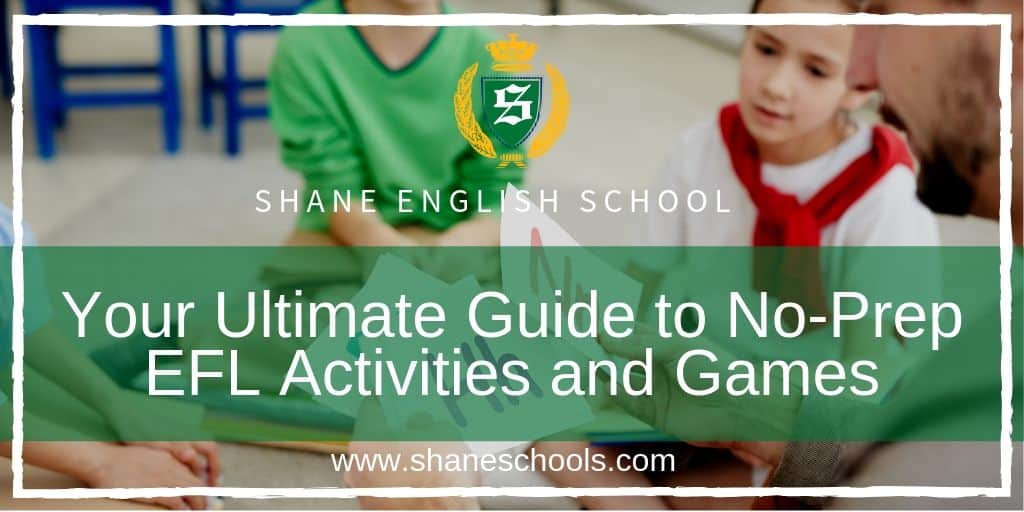Most (if not all) EFL teachers know the importance of incorporating games and activities in their learning English as a Foreign Language classrooms, and beyond that, it is crucial to have at least a handful of no-prep activities and games in your hat.
Why, you may wonder. We get into that in the next sections, so keep on reading. This is your ultimate guide to no-prep EFL activities and games, so get your notepads ready, take some notes, and implement some of these the next time you get a chance!
Why You Need No-Prep EFL Activities & Games
Fun games and activities are vital to all EFL classrooms, whether you are teaching kindergarteners, young learners, teenagers, or adults or in a traditional classroom or online environment. Activities and games not only liven up your lesson but they also keep students engaged by making learning fun. After all, we learn better when it doesn’t feel like a chore.
When To Use No-Prep Games & Activities
There are thousands of games and activities to practice conversation, reading, vocabulary, grammar, and even listening skills. Activities and games can be used at nearly any stage of your lesson, and most often, we include some of these when we plan our lessons and when it is time for students to practice what we have explained.
No-prep EFL activities and games are useful when/to:
- Warm up the class before you start teaching your lesson. This can help “activate” your students’ minds to work in and speak English.
- There is a lull in the classroom as students have lost interest and appear to not be listening. Take a break from your lesson plan and do one or two quick games and then return to your lesson. Or perhaps you’ve flown through a section faster than you thought you would and have a few minutes to give your students a break or reward.
- Your planned activities aren’t going well. Stop whatever activity that isn’t working and try one of the no-prep EFL activities on the list below and adapt it to work for your lesson or what you are teaching at the moment.
- End your lesson with an activity or game. This can be as a reward (play their favorite game) or a quick recap of what they learned (in today’s lesson or two lesson’s ago).
Want more about games in class? Why Do We Play EFL Games in Class?
The 3 Best No-Prep EFL Activities & Games
#1 Tic-Tac-Toe
This is a great way to motivate your students to get some work done, either from a worksheet or exercise book.
How To Play?
- Pair up your students.
- Show them briefly how to play tic-tac-toe if they are not familiar with the game.
- Working with their partner, each student takes turns completing one question/task from the worksheet or exercise book.
- If they answer correctly, they get to place an “x” on the tic-tac-toe grid.
- The second student then gets a chance to answer; if correct, they place their “o” on the grid.
- Should the answer be incorrect, the student doesn’t get to place an “x” or “o”.
- Students keep playing until one person wins; if there is extra time, they start again and complete more tasks.
#2 Vocabulary Bingo
Vocabulary Bingo is a no-prep EFL game that students can play to revise the vocabulary they have learned.
How To Play?
- Each student writes about 12 to 15 vocabulary items on a piece of paper. You should set where they can get these terms from. Hopefully each student will have a different set of vocab items.
- Students mingle in pairs.
- Scenario 1: Student X describes the word on their list (give a definition or example or both), and student Y names the word.
- Scenario 2: Student X says a word on their list and student Y needs to describe, give an example, or both.
- If student Y is correct, student X crosses the word off their list. If not correct, they don’t cross off the item.
- Students change roles. Once student Y crosses of a word on their list, the students swaps lists, so student X will have Y’s list and vice versa. (Students can play without swapping lists, but this makes it more challenging.)
- The students then need to find another partner, and once another item is crossed off, they swap lists again, etc.
- The first student who crosses off the last item on the list they currently have needs to shout “Bingo”. They “win” and can get a reward.
PRO TIP: You can adapt this game to suit grammar or other English skills too. Be creative!
#3 Hot Seat
This game can be used to build vocabulary and helps develop students’ listening and speaking skills. It also fosters some friendly competition.
How To Play?
- Divide the class into at least two groups.
- Students choose one person from their group to take the Hot Seat; those in the Hot Seat should face their group with the board/wall behind them.
- Write a word on the board for each group.
- Members of the group need to describe the word to the student in the Hot Seat. Rules are they can’t spell, draw, or say the word. The student in the Hot Seat needs to guess the word in a limited amount of time.
- The group that correctly guesses the word wins. Choose new words and play again.
You can also find out more the
Final Thoughts
As you can see, having a few (the more, the better) no-prep EFL games and activities to help you in class is always a great idea.
Have any more no-prep EFL activities and games up your sleeve you would want to share? Please let us know in the comments section below.
Want more? Check out more no-prep ESL games here or here.
Author’s Blurb
Denine W is a freelance EFL teacher, writer, and editor/proofreader. She taught EFL to young learners (from kindergarten to high school students) in Taiwan and to adults and young learners in an online EFL environment. In whatever free time is left, she plans her next trip abroad, reads, and does online grammar quizzes.

We're hiring!
With schools around the world, Shane English School always has exciting new opportunities to offer.


